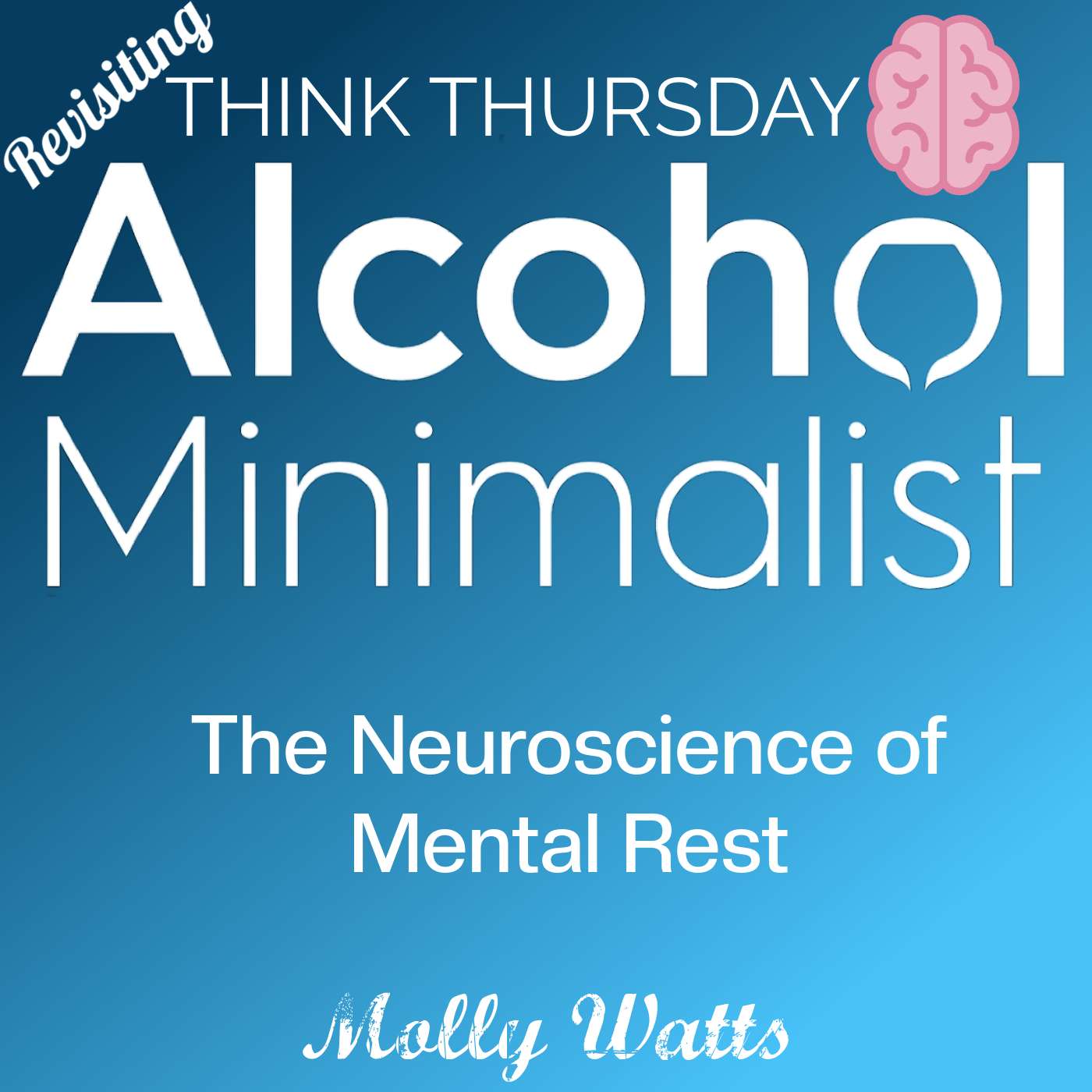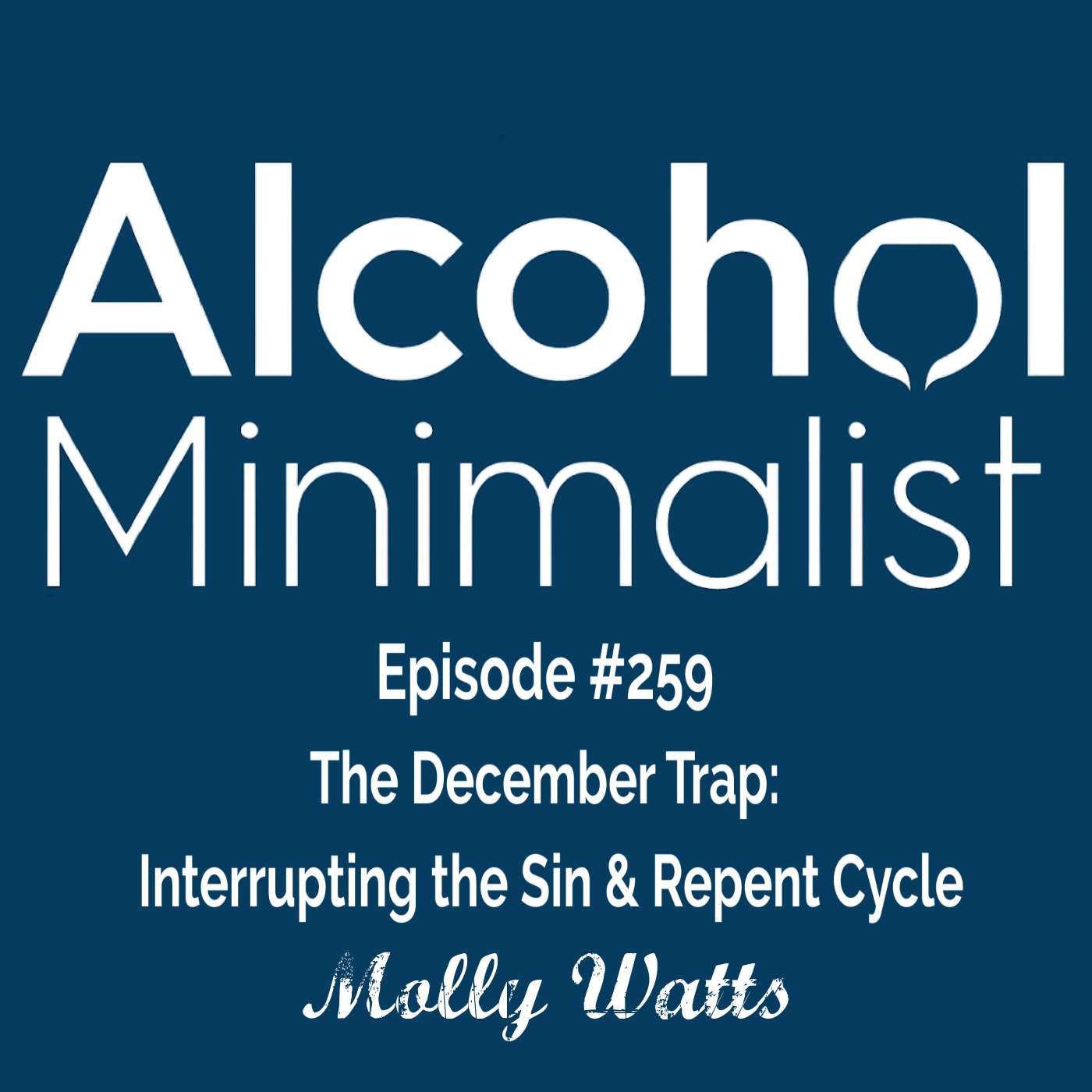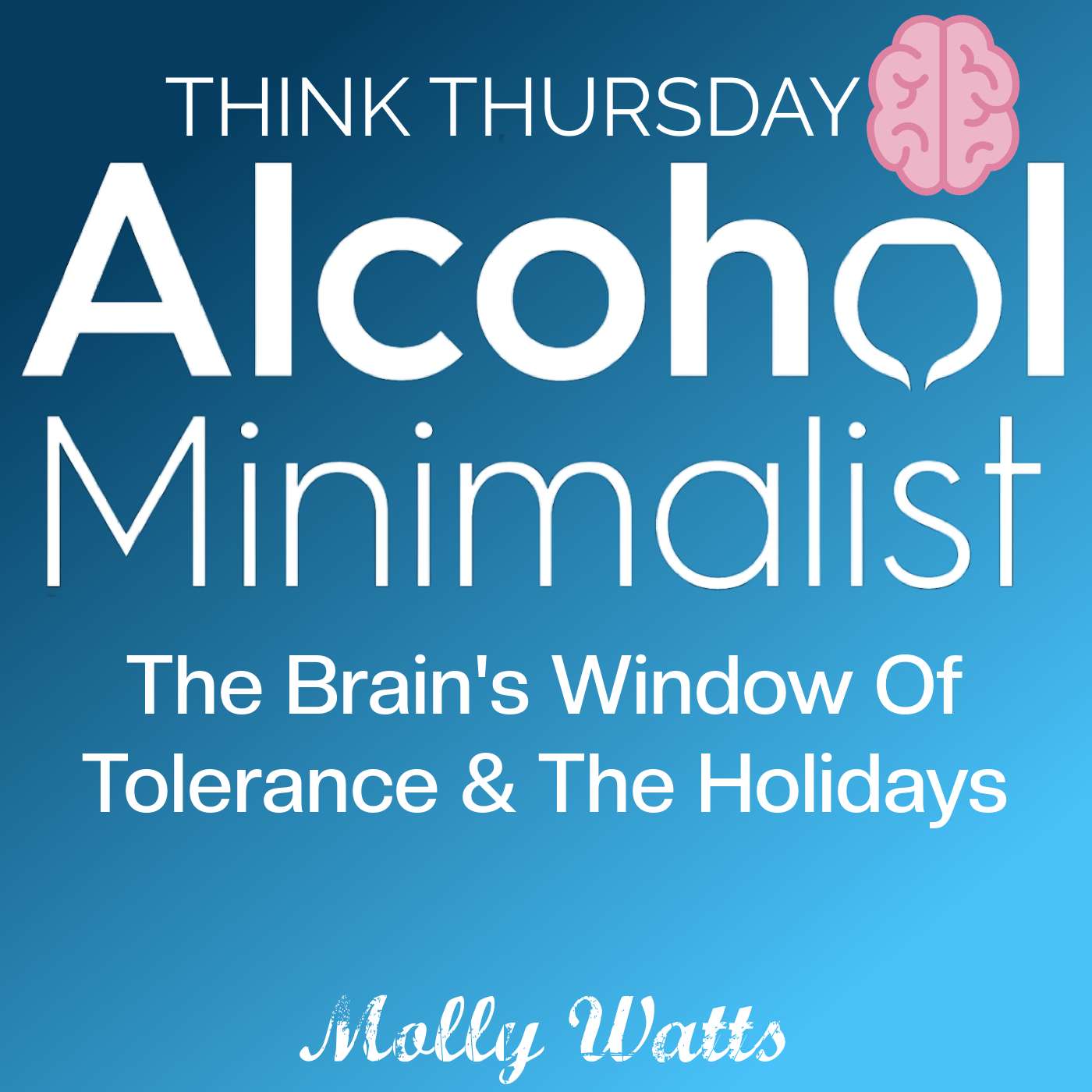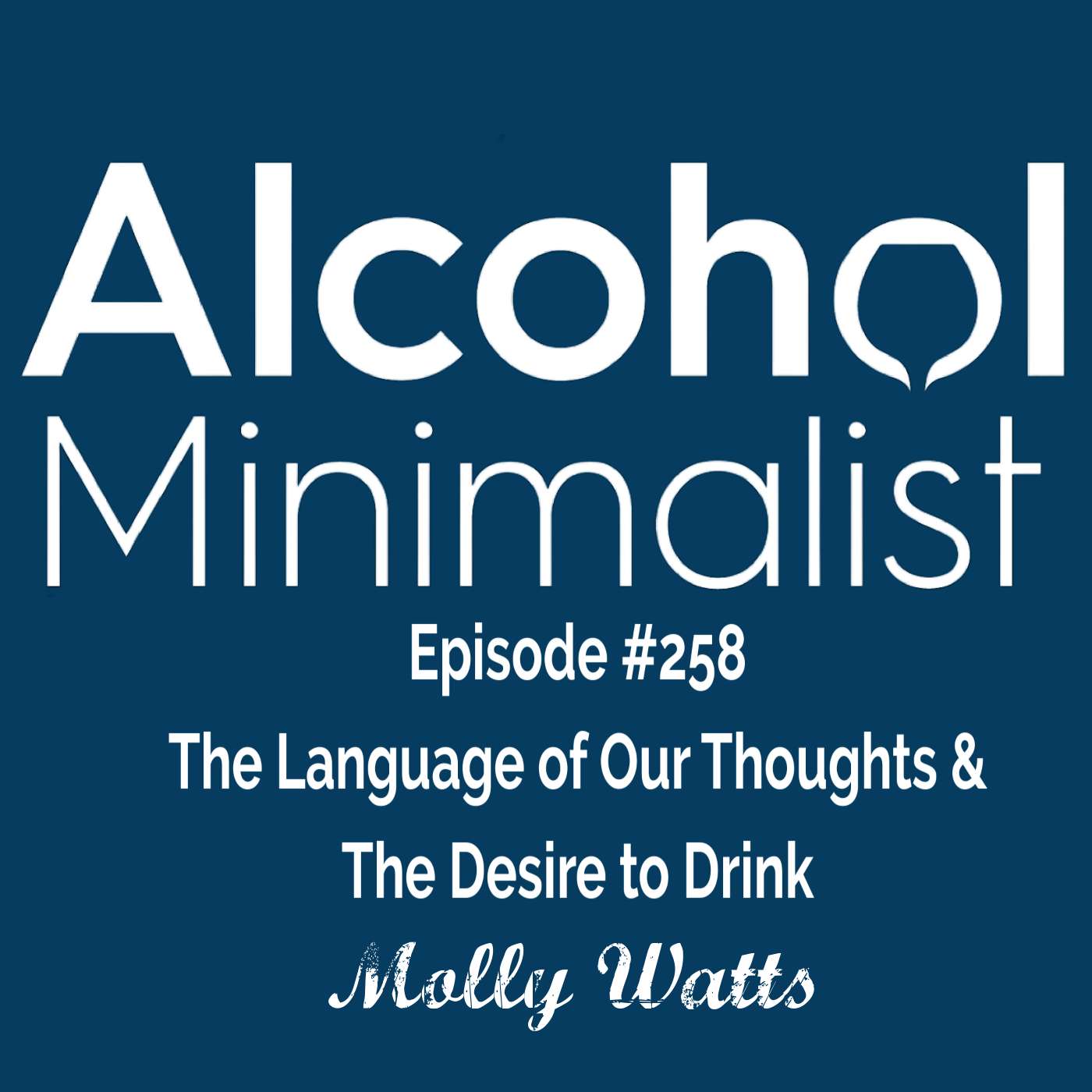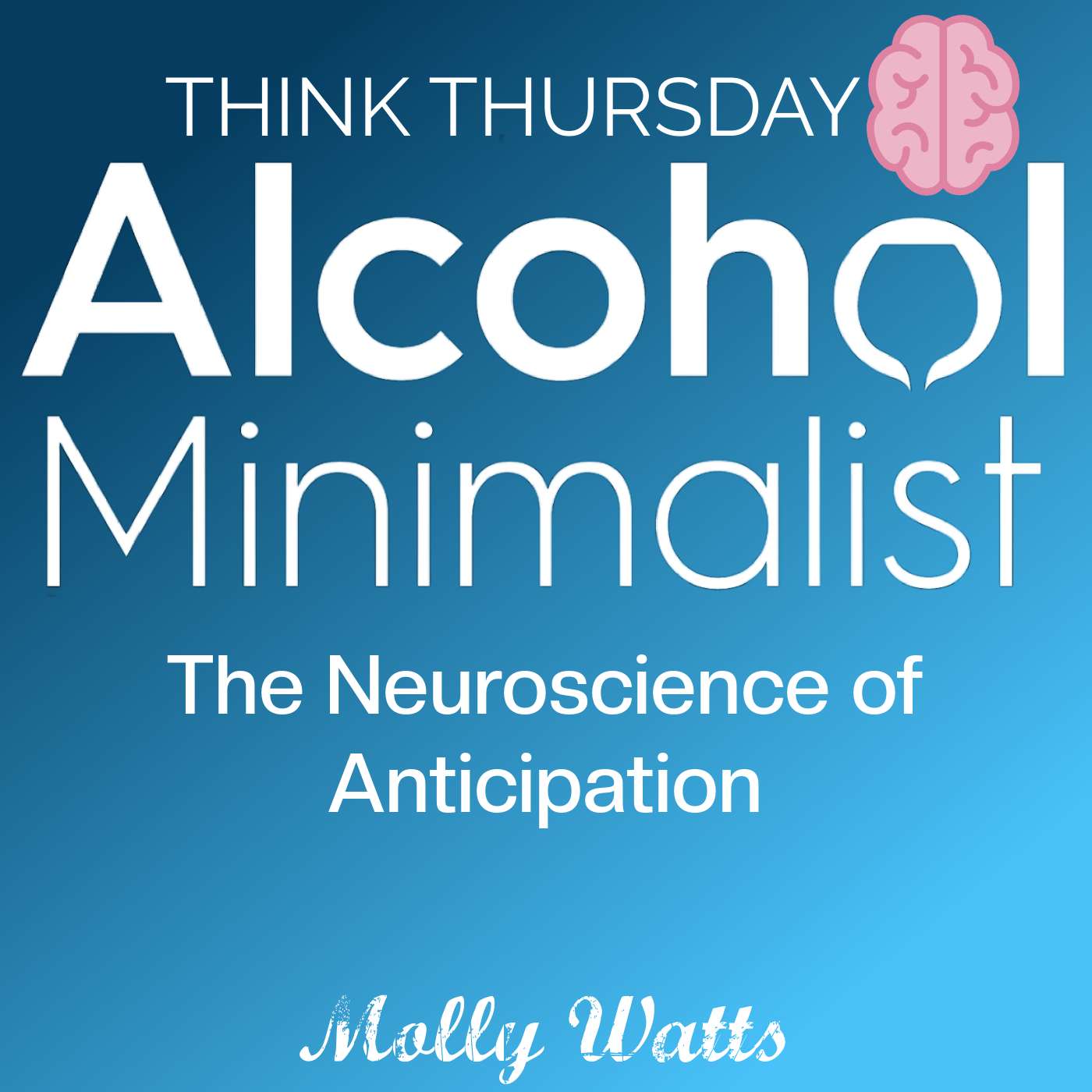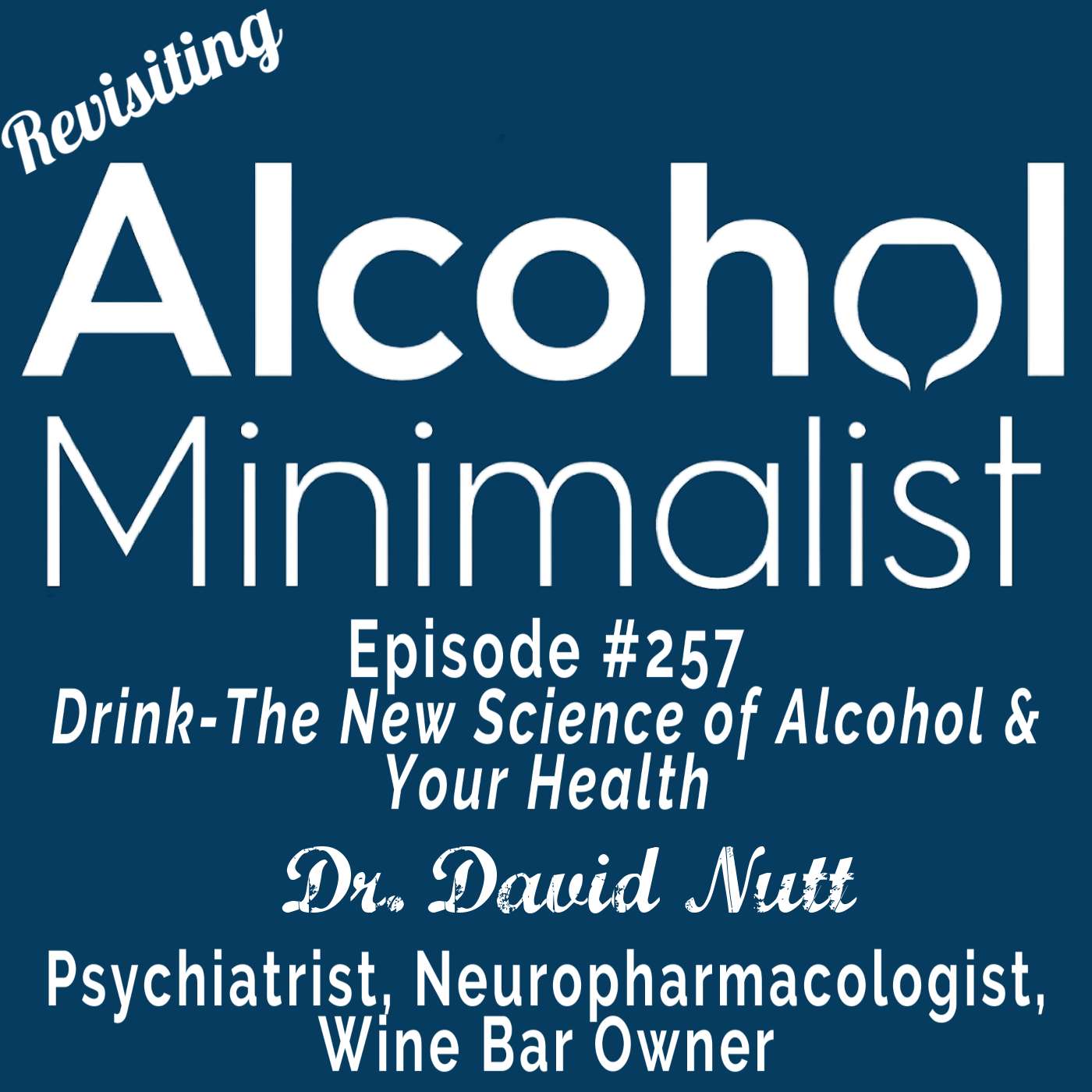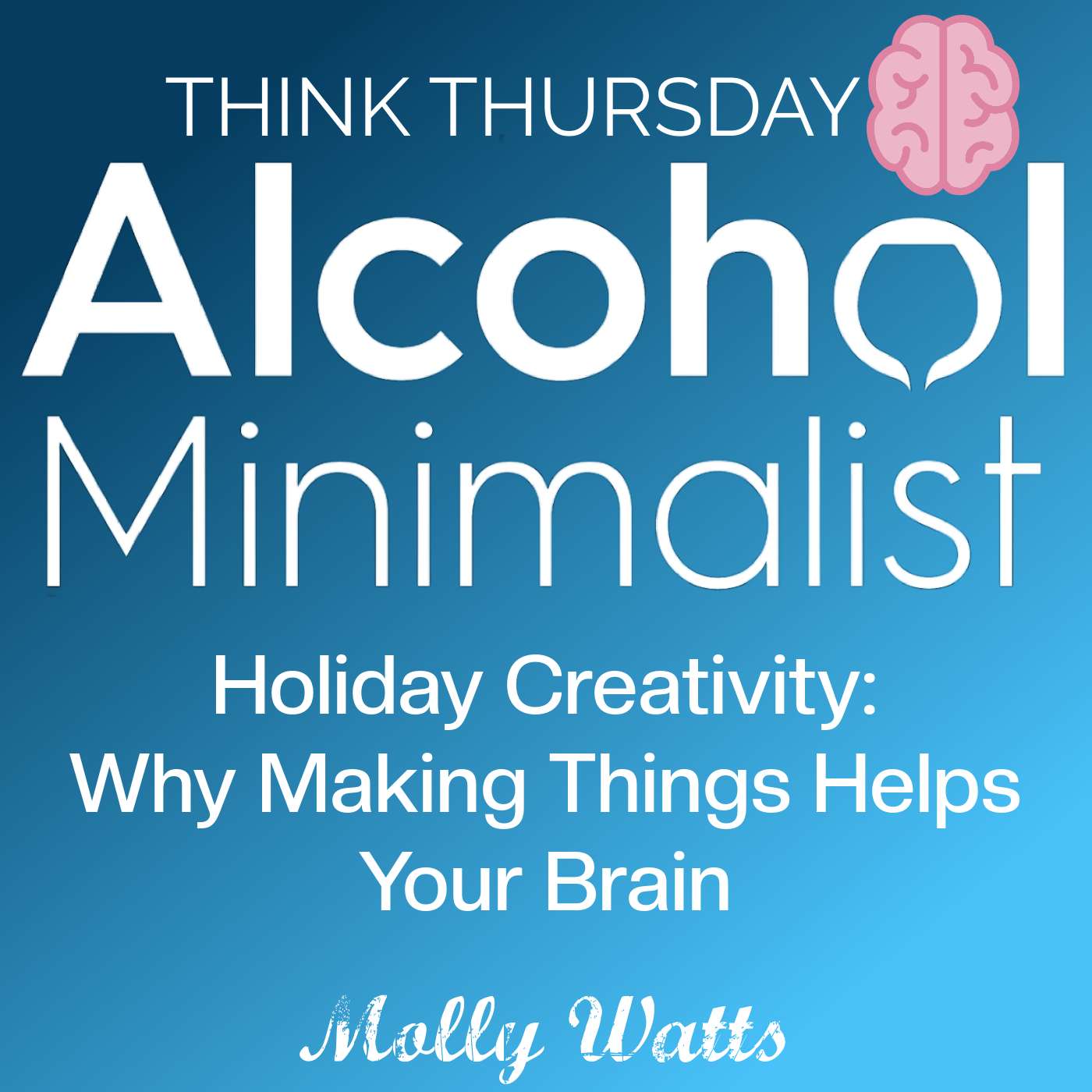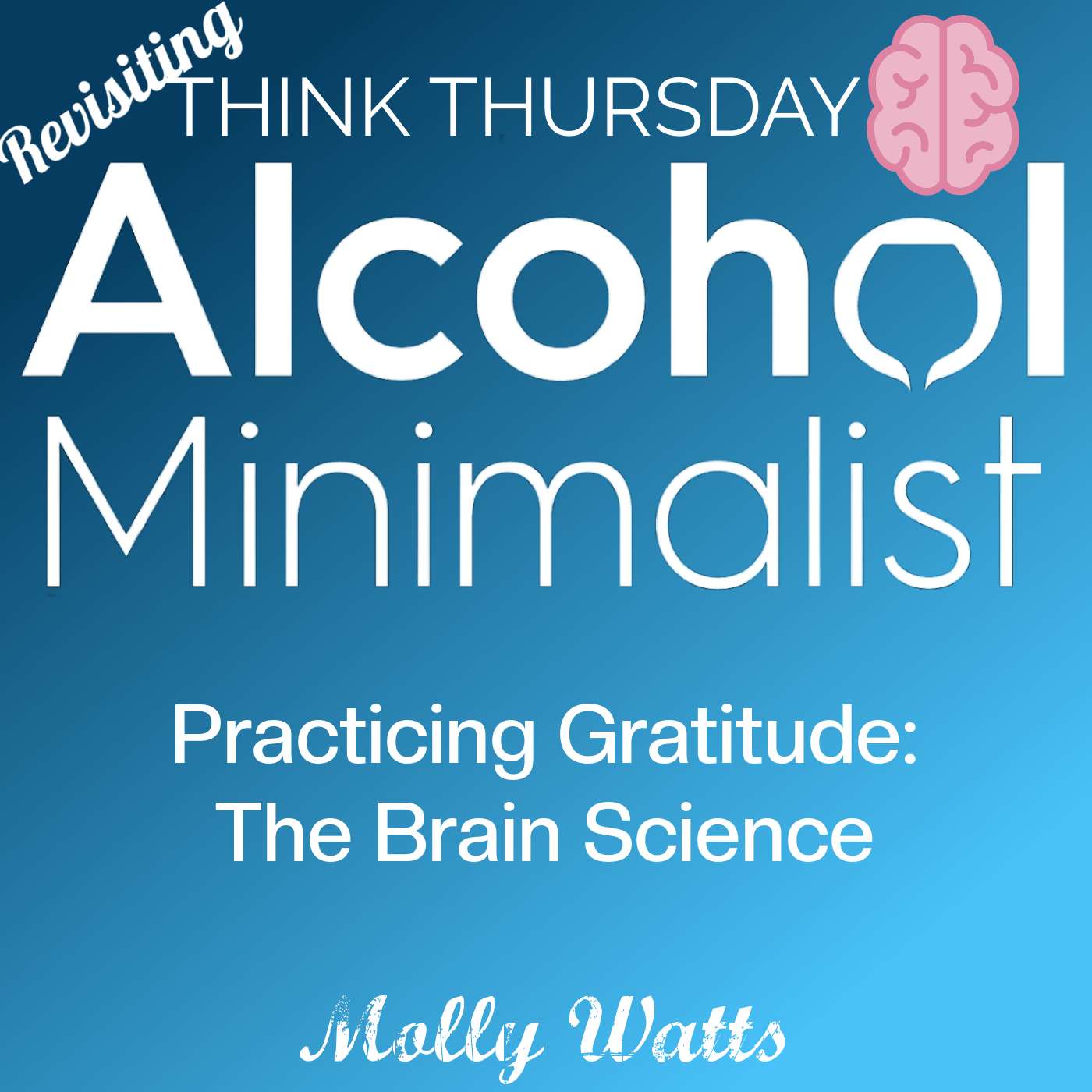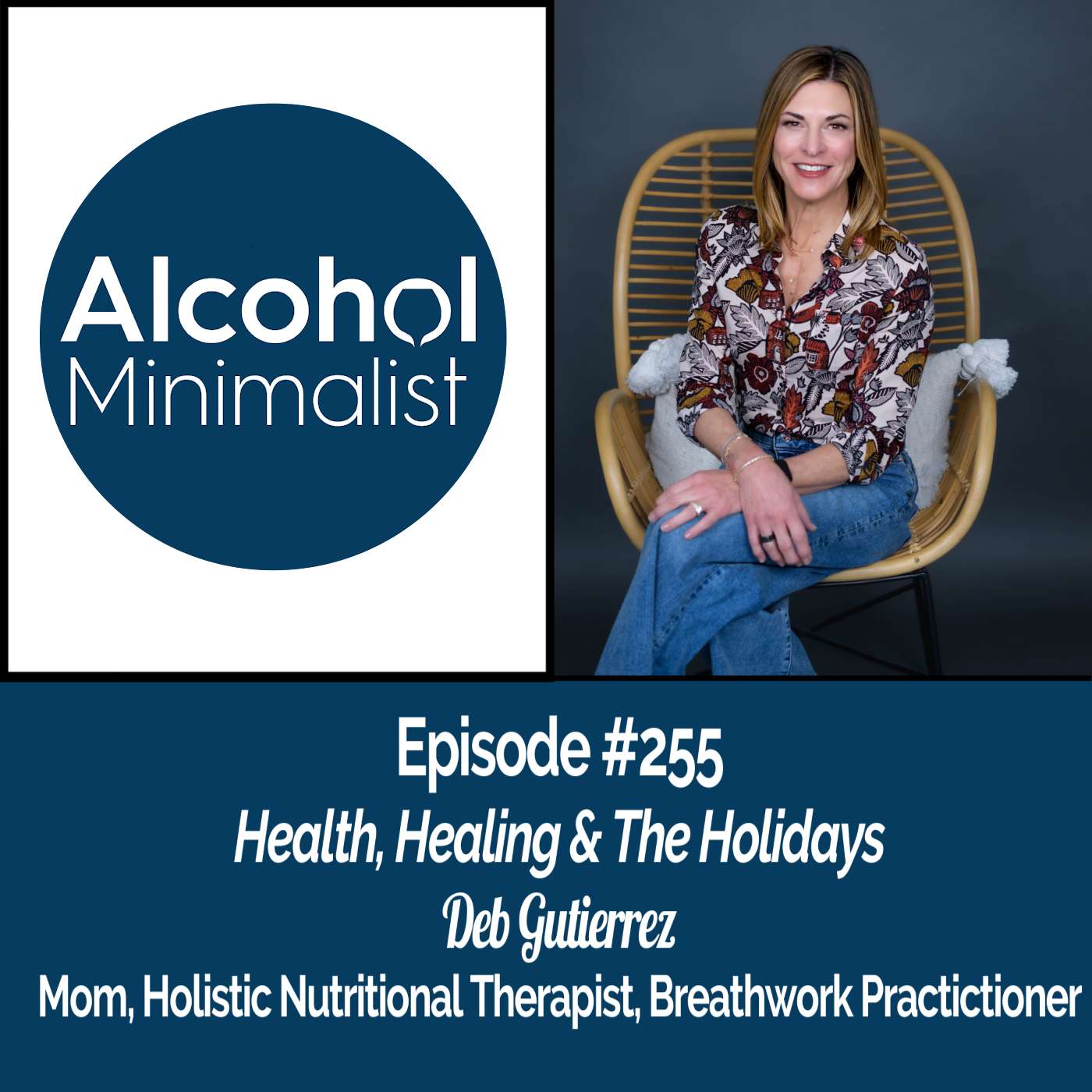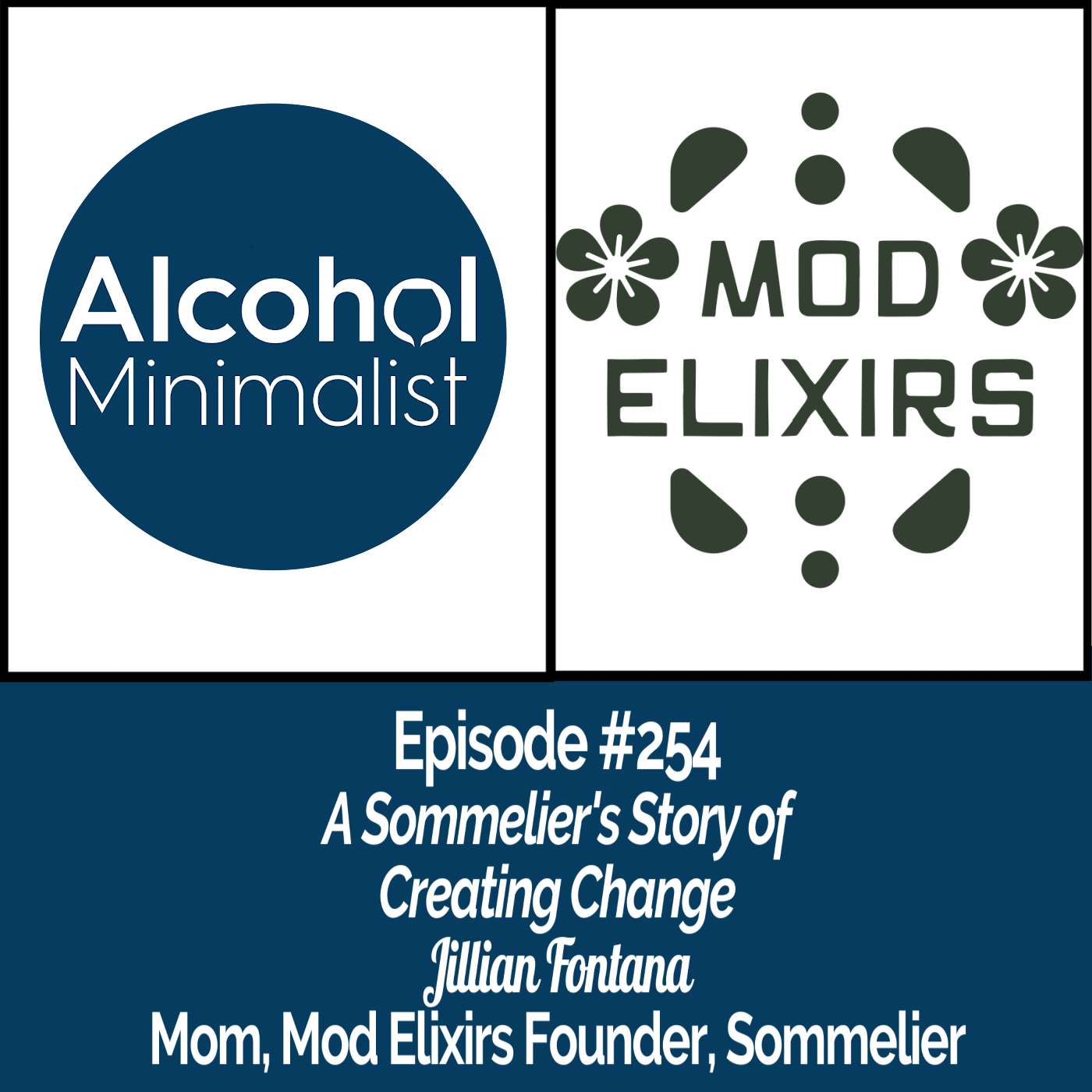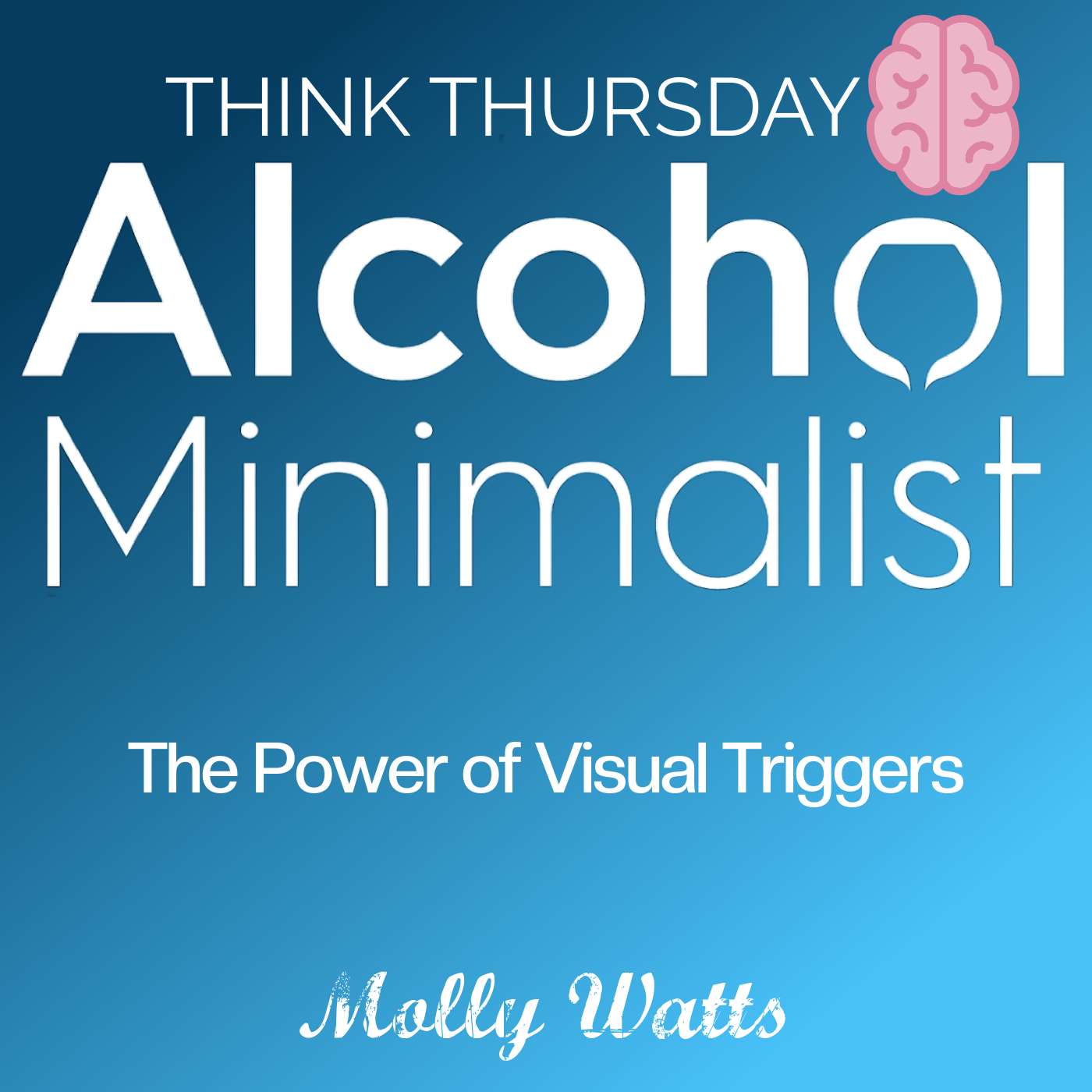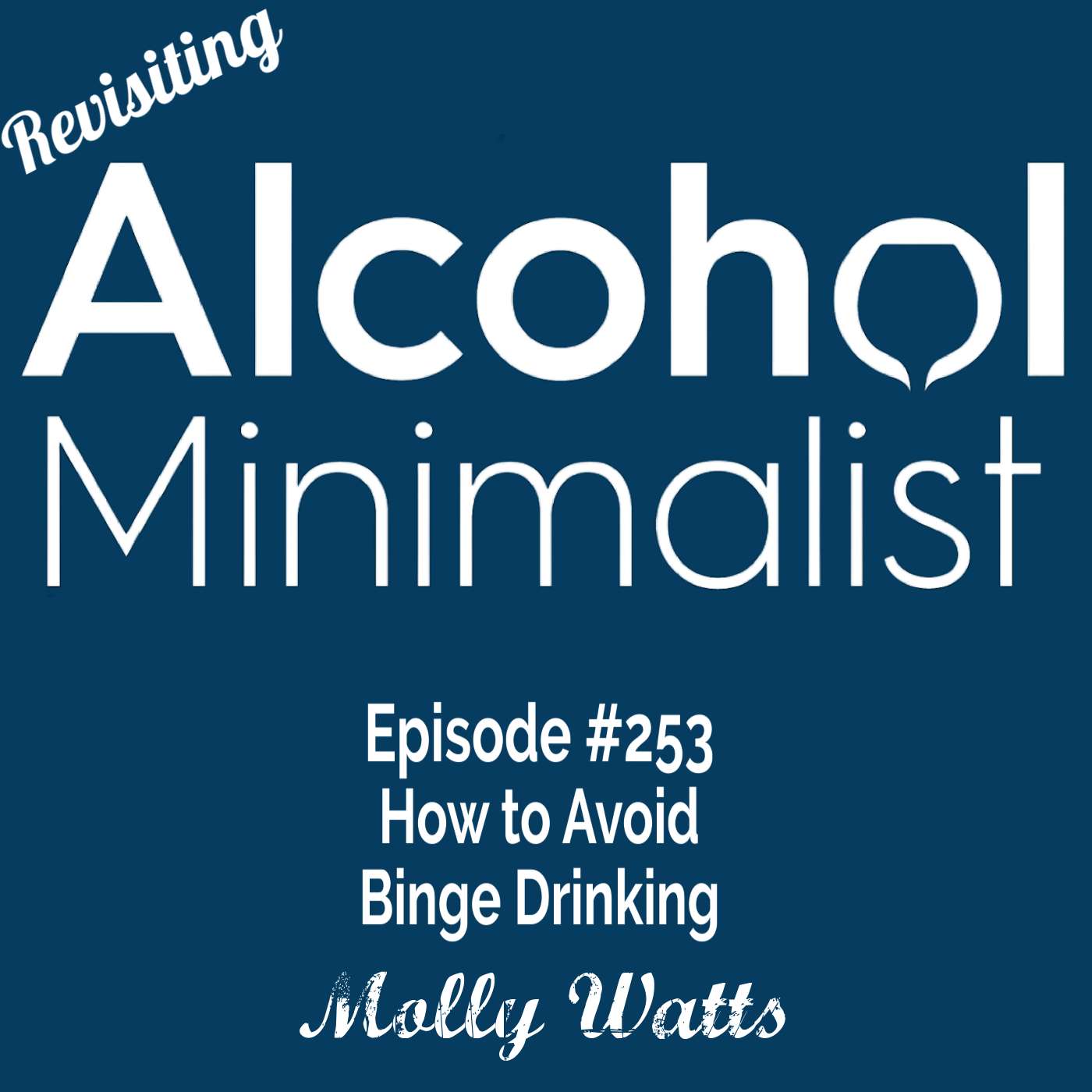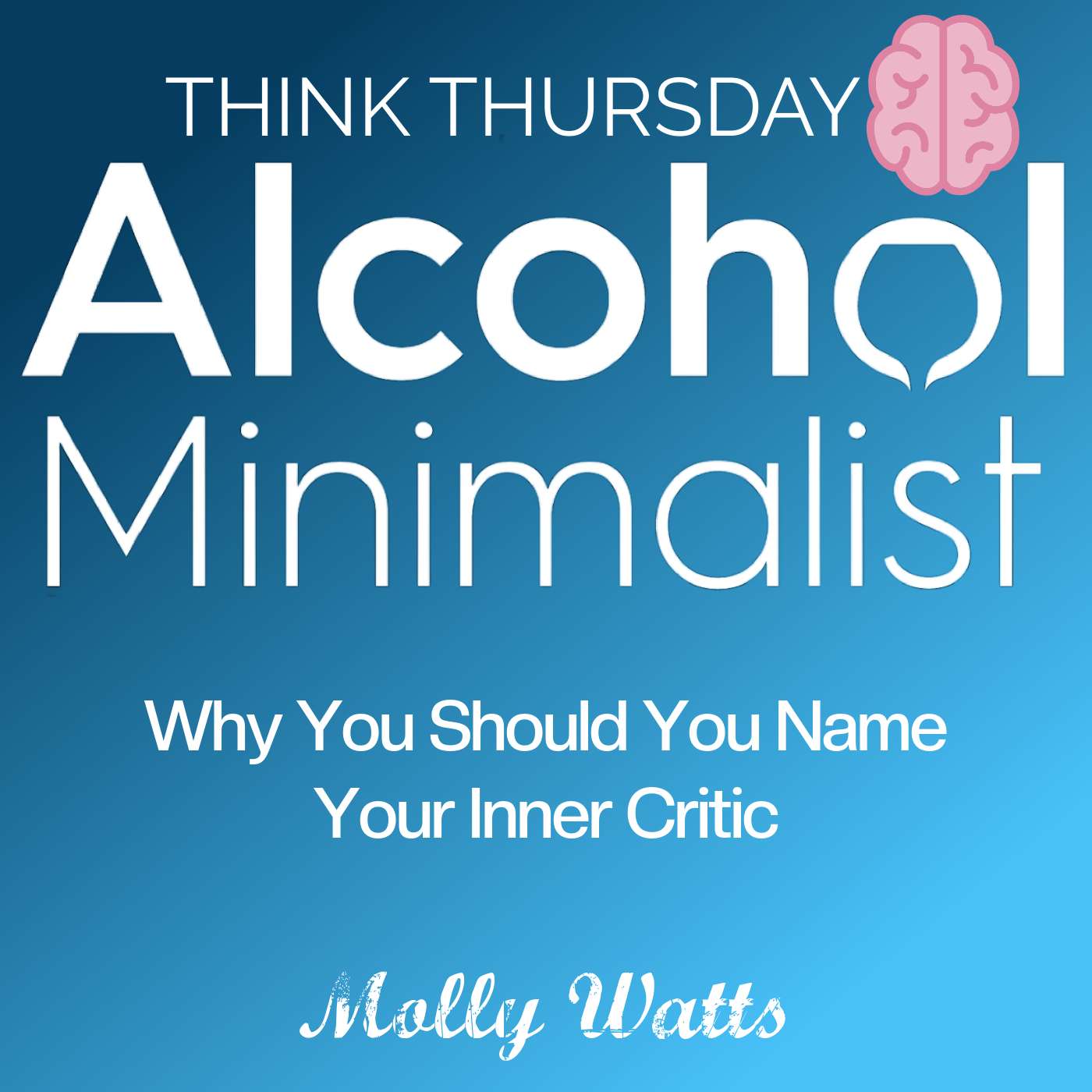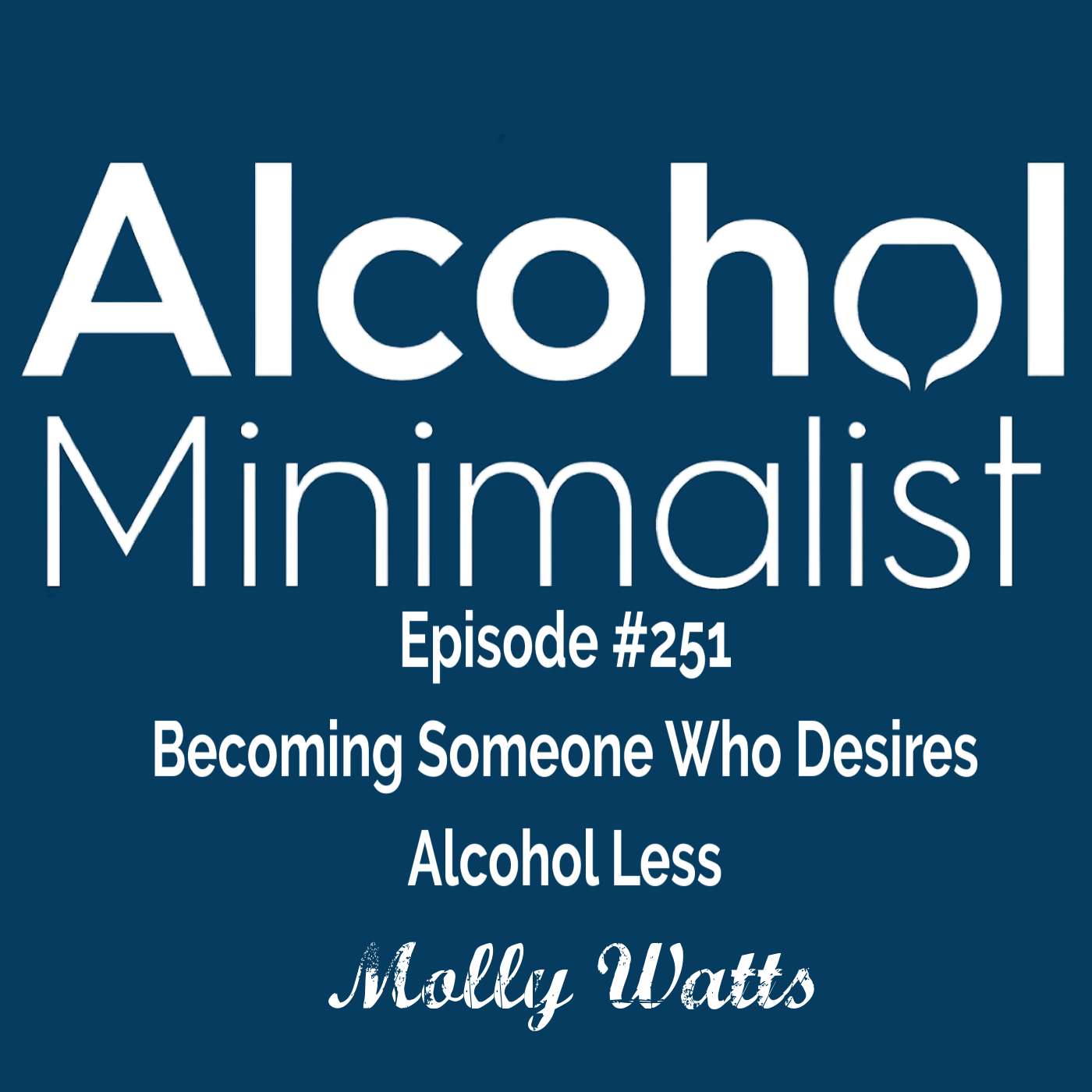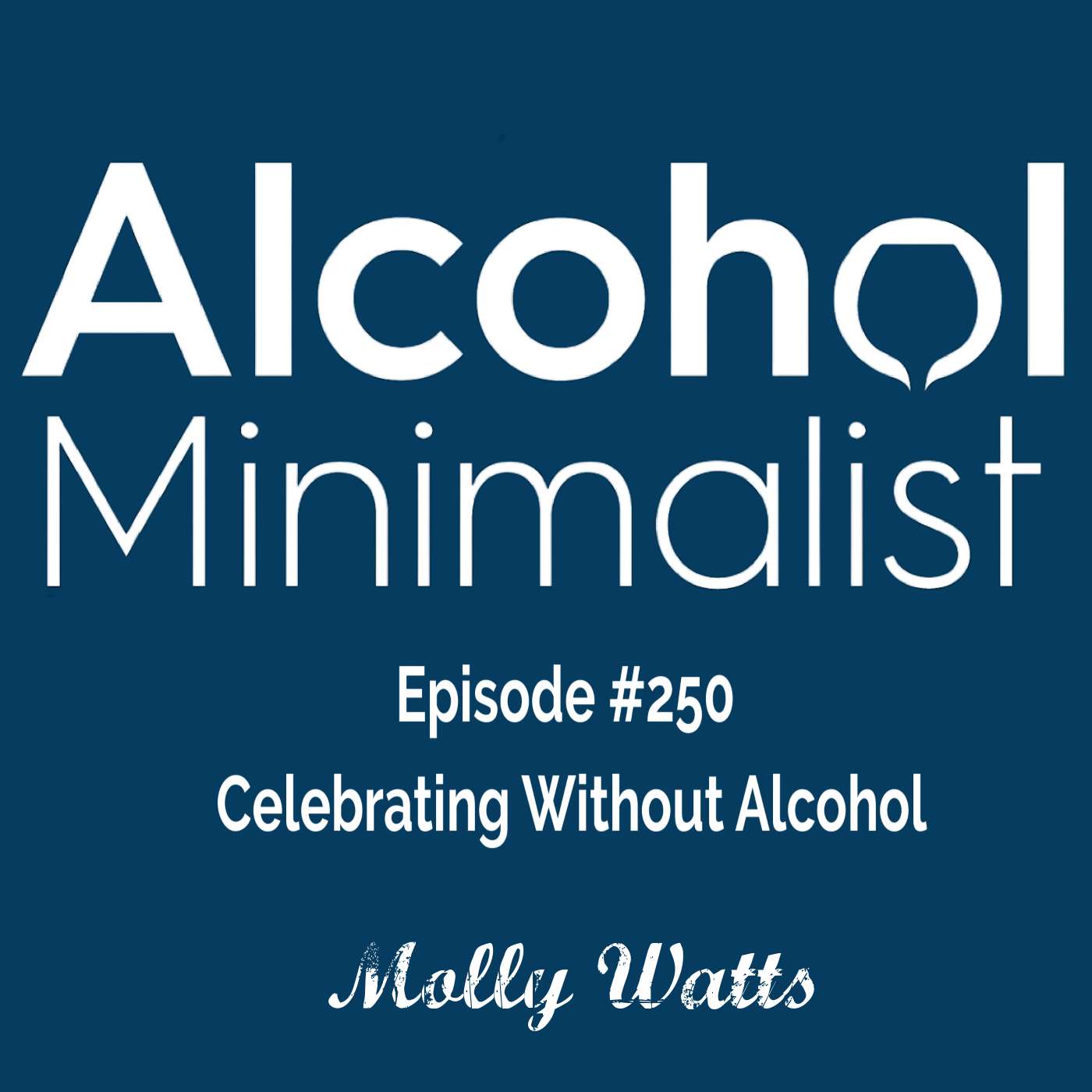Discover Alcohol Minimalist: Change Your Drinking Habits!
Alcohol Minimalist: Change Your Drinking Habits!

Alcohol Minimalist: Change Your Drinking Habits!
Author: Molly Watts, Author & Coach
Subscribed: 174Played: 9,642Subscribe
Share
©2023
Description
Change your relationship with alcohol without shame, guilt, or going sober. Join science-based coach Molly Watts to break habits and find peace through mindful drinking.
Hosted by author and coach Molly Watts, this show is for daily habit drinkers, adult children of alcoholics, and anyone stuck in the “gray area” of alcohol use.
Each episode blends neuroscience, behavior change psychology, and real-world strategies to help you build peace with alcohol — past, present, and future.
You’re not broken. You’re not powerless. You just need new tools.
Less alcohol. More life. Let’s do it together.
New episodes every Monday & Thursday.
Becoming an alcohol minimalist means:
Choosing how to include alcohol in our lives following low-risk guidelines.
Freedom from anxiety around alcohol use.
Less alcohol without feeling deprived.
Using the power of our own brains to overcome our past patterns and choose peace.
The Alcohol Minimalist Podcast explores the science behind alcohol and analyzes physical and mental wellness to empower choice. You have the power to change your relationship with alcohol, you are not sick, broken and it's not your genes!
This show is intended for educational purposes and does not constitute medical advice. If you are physically dependent on alcohol, please seek medical help to reduce your drinking.
Hosted by author and coach Molly Watts, this show is for daily habit drinkers, adult children of alcoholics, and anyone stuck in the “gray area” of alcohol use.
Each episode blends neuroscience, behavior change psychology, and real-world strategies to help you build peace with alcohol — past, present, and future.
You’re not broken. You’re not powerless. You just need new tools.
Less alcohol. More life. Let’s do it together.
New episodes every Monday & Thursday.
Becoming an alcohol minimalist means:
Choosing how to include alcohol in our lives following low-risk guidelines.
Freedom from anxiety around alcohol use.
Less alcohol without feeling deprived.
Using the power of our own brains to overcome our past patterns and choose peace.
The Alcohol Minimalist Podcast explores the science behind alcohol and analyzes physical and mental wellness to empower choice. You have the power to change your relationship with alcohol, you are not sick, broken and it's not your genes!
This show is intended for educational purposes and does not constitute medical advice. If you are physically dependent on alcohol, please seek medical help to reduce your drinking.
334 Episodes
Reverse
In this special holiday revisited episode of Think Thursday, Molly explores why mental rest is essential for brain health, especially coming out of a season of overstimulation. She explains how modern life is designed to hijack our attention, keeping us in constant reaction mode and depriving the brain of the downtime it needs to function well.Molly breaks down what happens neurologically when the brain is exposed to nonstop input, including cognitive fatigue, reduced creativity, increased stress, and weaker memory consolidation. She revisits the role of the default mode network and explains why creativity and quiet, not constant consumption, are key to restoring mental clarity and emotional regulation.The episode closes with practical, science backed strategies for reclaiming mental rest and intentionally creating space for the brain to recover and thrive.What You’ll LearnThe difference between mental rest and sleep or meditationWhy the brain is not designed for constant stimulationHow nonstop input leads to cognitive fatigue and decision fatigueThe role of the default mode network in creativity and problem solvingWhy overstimulation increases stress, anxiety, and emotional reactivityHow modern technology has removed natural stopping points for the brainWhy attention is the product in today’s digital economyKey Concepts ExplainedCognitive fatigue from continuous information processingDefault mode network and its role in reflection and creativitySympathetic nervous system activation from constant stimulationMemory consolidation requiring downtime and restAttention as a limited resource that must be protected intentionallyPractical Strategies Shared in the EpisodeSchedule at least 30 minutes of tech free time each dayEmbrace boredom and allow moments of silence without distractionCreate a no phone zone in one part of your day, such as meals or bedtimeReplace scrolling with hands on, real world creativityPrioritize presence over constant consumptionReal World Creativity Ideas MentionedPlaying music or learning an instrumentDrawing, painting, or doodlingWriting by hand through journaling or copying quotesGardening, crafting, sculpting, or woodworkingCreative movement such as dancing, stretching, or mindful walkingWhy Mental Rest MattersMental rest is not wasted time. It allows the brain to process information, regulate emotions, consolidate memory, and restore cognitive energy. Without intentional breaks, the brain stays in reaction mode, making it harder to focus, create, and feel calm.Listener InvitationFor the next 24 hours, find one way to engage in real world creativity with no screens involved. Notice how your brain and body feel afterward, and share your experience by emailing Molly or connecting in The Alcohol Minimalist community.
★ Support this podcast ★
In this episode of the Alcohol Minimalist podcast, Molly tackles a common end-of-year mindset trap: the “sin and repent” cycle. It’s the idea that December is for overindulgence and January is for repentance—a pattern that often reinforces all-or-nothing thinking and keeps us stuck in old drinking habits.Through personal reflections and practical coaching, Molly unpacks the power of permission-giving thoughts like “It’s the holidays, I deserve this” or “I’ll get back on track in January.” These seemingly harmless ideas delay change, undermine self-trust, and reinforce avoidance patterns.But there’s a better way—and it starts by practicing mindful thought shifts right now, not later. With her See, Soothe, Separate, Shift method and a science-backed approach to building new thought habits, Molly shows listeners how to move through the holiday season with more clarity, agency, and peace.What You’ll Learn in This Episode:Why the “I’ll be good in January” mindset is not harmless—and how it reinforces habits you're trying to breakWhat permission-giving thoughts sound like and why they feel so rationalHow delaying behavior change until January trains your brain to avoid discomfortThe difference between self-compassion and excuse-makingHow to use the See, Soothe, Separate, Shift framework to rewire your thinking in real timeKey Quote“It’s not a willpower problem—it’s a pattern problem. The thoughts you choose now are training your brain for what you'll do next month and next year.”Mentioned in This EpisodeBehavior Map – Results CycleSee, Soothe, Separate, Shift framework for thought changeGet InvolvedJoin Mostly Dry January: The Daily Go beyond white-knuckling Dry January. Molly’s new daily experience gives you:Real-time behind-the-scenes video check-insA private podcast feed for bite-sized daily mindset coachingWeekly science-backed brain lessonsLive group coachingAccess to a private Facebook community Sign up here: [Insert Link] or visit mollywatts.com/dryjanuaryTake Action This WeekYou don’t need to “start over” in January. You can begin noticing and shifting thoughts right now—before the year ends.Ask yourself:Is this a self-compassionate thought?Or is it a permission-giving excuse?What’s one small choice I can make today that aligns with who I’m becoming?Low risk drinking guidelines from the NIAAA:Healthy men under 65:No more than 4 drinks in one day and no more than 14 drinks per week.Healthy women (all ages) and healthy men 65 and older:No more than 3 drinks in one day and no more than 7 drinks per week.One drink is defined as 12 ounces of beer, 5 ounces of wine, or 1.5 ounces of 80-proof liquor. So remember that a mixed drink or full glass of wine are probably more than one drink.Abstinence from alcoholAbstinence from alcohol is the best choice for people who take medication(s) that interact with alcohol, have health conditions that could be exacerbated by alcohol (e.g. liver disease), are pregnant or may become pregnant or have had a problem with alcohol or another substance in the past.Benefits of “low-risk” drinkingFollowing these guidelines reduces the risk of health problems such as cancer, liver disease, reduced immunity, ulcers, sleep problems, complications of existing conditions, and more. It also reduces the risk of depression, social problems, and difficulties at school or work.
★ Support this podcast ★
In this Think Thursday episode, Molly explains why the holiday season can feel emotionally harder even when nothing is “wrong.” Using neuroscience and psychology, she introduces the concept of the window of tolerance and explores how cumulative stress, anticipation, sensory overload, emotional memory, and disrupted routines narrow our capacity for regulation during December.Molly walks through what happens in the brain under prolonged stress, including the role of cortisol, emotional flooding, and nervous system survival responses. She reframes coping behaviors as signals of an overwhelmed nervous system rather than a lack of discipline, and shares realistic, supportive ways to gently expand capacity during a demanding season.What You’ll LearnWhat the window of tolerance is and why it mattersHow December compresses our stress tolerance through cumulative demandsWhy anticipation can activate stress before events even happenThe role of cortisol in emotional flooding and impulse controlHow the prefrontal cortex, amygdala, and hippocampus are affected by prolonged stressWhy coping urges increase when nervous system capacity is lowPractical, doable ways to support regulation without adding pressureKey Concepts ExplainedWindow of tolerance as a flexible range that expands and contractsHyperarousal and hypoarousal as nervous system survival statesEmotional flooding when feelings rise faster than regulation systems can manageCapacity over discipline as a more helpful framework for behavior change during stressful seasonsPractical Tools Shared in the EpisodeCreating predictability with small daily routinesUsing gentle movement to lower cortisolSupporting the nervous system through sensory regulation like warmth, sound, and lightTaking frequent micro recovery moments rather than long breaksNaming emotions to reduce amygdala activationAdjusting expectations when capacity is lowerChoosing stability over optimization during high stress periodsResearch and References MentionedDr. Dan Siegel’s Window of Tolerance modelResearch in Psychoneuroendocrinology on cortisol and prolonged stressNeuroscience findings on stress effects in the prefrontal cortex, amygdala, and hippocampusUCLA research on affect labeling and emotion regulationThe Feelings Wheel by Dr. Gloria Wilcox, referenced from Breaking the Bottle LegacyRelated Think Thursday EpisodesThe Neuroscience of AnticipationSelective IgnoranceDefensive PessimismNovelty for Habit ChangeThe Neuroscience of Mental Rest
★ Support this podcast ★
In this episode of the Alcohol Minimalist podcast, Molly explores one of the most powerful yet under-recognized tools for transforming your relationship with alcohol: the language you use in your thoughts.She explains how common phrases like “I need a drink” or “I deserve this glass of wine” are not just throwaway expressions. These words create specific emotional reactions that drive habitual behaviors, especially during emotionally charged moments. Using the Alcohol Minimalist framework and the Behavior Map – Results Cycle, Molly walks through how rewording your thoughts can unlock more peaceful, intentional decisions about drinking.This episode focuses on two key language pairs:“Need” vs. “Want”“Deserve” vs. “Choose”You’ll discover how shifting these words can reduce emotional urgency, increase your sense of agency, and help you align more closely with your alcohol core beliefs and long-term goals.What You’ll LearnWhy your thoughts matter more than you think—especially the words you useThe neurological and emotional impact of saying “I need” versus “I want”How “I deserve this” may be fueling your desire without your awarenessWhy choosing your language intentionally supports long-term changeHow to rewire beliefs using the Alcohol Core Beliefs framework and the Behavior Map – Results CycleMentioned in the EpisodeMolly’s book: Breaking the Bottle LegacyAlcohol Core Beliefs worksheetThe Behavior Map – Results CycleNew program announcement: Mostly Dry January – The Daily A daily support experience launching this January to help you stay focused, inspired, and mindful throughout the month.Key Quote“Your thoughts are not just background noise—they’re the engine behind your emotions and actions. Change the thought, and you change the result.” – Molly WattsLinks and ResourcesLearn more about the Alcohol Core BeliefsJoin the Mostly Dry January – The Daily experienceInstagram: @alcoholminimalistFacebook Group: Alcohol MinimalistsTake Action This WeekStart tuning into your internal dialogue. When you catch yourself thinking “I need a drink” or “I deserve this,” pause and reframe it. Try saying “I want a drink” or “I choose to have a drink” and notice the emotional difference.Language is the entry point to lasting change.Low risk drinking guidelines from the NIAAA:Healthy men under 65:No more than 4 drinks in one day and no more than 14 drinks per week.Healthy women (all ages) and healthy men 65 and older:No more than 3 drinks in one day and no more than 7 drinks per week.One drink is defined as 12 ounces of beer, 5 ounces of wine, or 1.5 ounces of 80-proof liquor. So remember that a mixed drink or full glass of wine are probably more than one drink.Abstinence from alcoholAbstinence from alcohol is the best choice for people who take medication(s) that interact with alcohol, have health conditions that could be exacerbated by alcohol (e.g. liver disease), are pregnant or may become pregnant or have had a problem with alcohol or another substance in the past.Benefits of “low-risk” drinkingFollowing these guidelines reduces the risk of health problems such as cancer, liver disease, reduced immunity, ulcers, sleep problems, complications of existing conditions, and more. It also reduces the risk of depression, social problems, and difficulties at school or work.
★ Support this podcast ★
Episode SummaryIn this Think Thursday episode, Molly explores why December feels so emotionally intense and why anticipation plays such a powerful role in our thoughts, feelings, and habits. Anticipation is not just psychological. It is driven by the brain's predictive systems that simulate the future long before it arrives.Using findings from neuroscience, including research highlighted in Neuron, University College London, Stanford University, and studies on dopamine and reward processing, Molly explains how imagining the future changes our emotional state in the present. She shows how anticipation can create craving, heighten anxiety, and influence behavior before anything even happens.Importantly, she connects this science to behavior change. When we understand anticipation, we gain the ability to shape our emotional experience, support our habit goals, and build a stronger relationship with our future selves.What You Will LearnWhy the brain is not reactive but predictiveHow the prospection network simulates possible futuresWhy anticipation activates the same regions involved in memory and emotionHow dopamine spikes during anticipation more than during rewardWhy the holidays intensify emotional forecastingHow the brain treats future you similarly to a strangerHow anticipation contributes to cravings, stress, and anxietyPractical strategies for using anticipation intentionally in behavior changeKey Insights from the EpisodeAnticipation is a physiological experience. Heart rate, dopamine, and emotional readiness all shift based on prediction.December amplifies anticipation because the brain is projecting ahead using vivid emotional memories from past holidays.Many habit patterns with alcohol, eating, and spending are anticipatory rather than reactive in the moment.The medial prefrontal cortex becomes less active when imagining the distant future, which explains why future you feels separate.Mental rehearsal activates the same neural pathways as actual behavior and can support intentional change.Anticipatory framing can influence how stressful events are interpreted afterward.Practical Tools from the Episode1. Anticipate the emotional landscape, not the event. Shift from worrying about what will happen to planning for how you want to feel.2. Rehearse your chosen identity. Imagine yourself acting in alignment with your values to strengthen the neural pathways that support follow-through.3. Shorten the distance to future you. Ask questions like:What will tonight's me thank me forWhat does tomorrow morning's me need4. Anticipate urges with curiosity. Recognize that urges are forecasts of relief, not emergencies.5. Create micro anticipations that ground you. Examples include expecting the first sip of warm tea, a quiet step outside, or the feeling of waking up proud the next morning.Studies and Sources Mentioned2023 review in Neuron on the prospection networkUniversity College London study on dopamine release during anticipatory uncertaintyStanford University research on future self representation in the brainStudies from the University of Michigan and Max Planck Institute on dopamine and anticipation2024 Psychological Science study on anticipatory framing and stress interpretation
★ Support this podcast ★
If you’re working to change your drinking habits and create a peaceful relationship with alcohol, you’re in the right place. In today’s episode, we revisit a very special conversation with internationally renowned neuropsychopharmacologist, Dr. David Nutt.This episode originally aired when the podcast was still called Breaking the Bottle Legacy, but the message and insights are just as powerful—and relevant—today.In this episode, Molly speaks with Dr. David Nutt, author of Drink? The New Science of Alcohol and Your Health. The conversation dives into the science behind alcohol’s impact on the brain and body, while also exploring how to make more informed, intentional choices about drinking.Dr. Nutt shares:Why he wrote Drink?, and why science must inform our alcohol decisionsThe duality of alcohol: pleasure and poisonHis personal journey with alcohol, including owning a wine bar while being a leading voice in alcohol harm reductionHow using science can help you assess the role of alcohol in your life and your long-term goalsWhy This Episode MattersMolly revisits this conversation as a holiday-season reminder: it’s possible to enjoy social events with alcohol while staying aligned with your goals. Dr. Nutt emphasizes the power of planning ahead, staying self-aware, and not drinking alone—core pillars of the Alcohol Minimalist approach.If you’re seeking peace with alcohol—not necessarily abstinence—this episode delivers practical insights and validation that change is possible when you lead with knowledge and intention.Resources MentionedBook: Drink? The New Science of Alcohol and Your Health by Dr. David NuttWebsite: mollywatts.comTakeawaysAlcohol is a drug—understanding that fact is key to moderation“Think about drink”: intentionality and self-reflection help you stay in controlYou can challenge past patterns and create a new story for yourselfSubscribe and Share If this episode resonated with you, please subscribe and share it with a friend. And if you have a favorite adjective for your weather report or a show guest you’d love to hear from, email Molly at molly@mollywatts.comLow risk drinking guidelines from the NIAAA:Healthy men under 65:No more than 4 drinks in one day and no more than 14 drinks per week.Healthy women (all ages) and healthy men 65 and older:No more than 3 drinks in one day and no more than 7 drinks per week.One drink is defined as 12 ounces of beer, 5 ounces of wine, or 1.5 ounces of 80-proof liquor. So remember that a mixed drink or full glass of wine are probably more than one drink.Abstinence from alcoholAbstinence from alcohol is the best choice for people who take medication(s) that interact with alcohol, have health conditions that could be exacerbated by alcohol (e.g. liver disease), are pregnant or may become pregnant or have had a problem with alcohol or another substance in the past.Benefits of “low-risk” drinkingFollowing these guidelines reduces the risk of health problems such as cancer, liver disease, reduced immunity, ulcers, sleep problems, complications of existing conditions, and more. It also reduces the risk of depression, social problems, and difficulties at school or work.
★ Support this podcast ★
In this episode, Molly explores why holiday creativity is far more than a nostalgic pastime. New research highlighted in The Washington Post shows that engaging in creative activities, even at a beginner level, is associated with younger looking brains and stronger cognitive health.Molly explains how creative acts like crafting, drawing, baking and building stimulate multiple brain networks, reduce stress hormones, and support emotional regulation.She connects these findings to childhood holiday memories while discussing why those early creative experiences were neurologically important. Molly also shares how creativity can support habit change by providing a healthy reward pathway, reducing urges, and strengthening identity. The episode ends with simple, low pressure ideas for tapping into creativity during the holiday season.What You’ll LearnWhy creativity often feels counterintuitive but is deeply supported by neuroscienceHow creative activities activate the motor cortex, prefrontal cortex, reward system and the default mode networkThe connection between creativity, reduced cortisol, and emotional regulationWhy childhood crafting strengthened attention, fine motor skills and dopamine pathwaysHow creativity supports behavior change and identity transformationWhy the holiday season is a perfect time to reconnect with play and creative explorationSimple, nostalgic creative ideas that help the brain settle and feel groundedKey Ideas from the EpisodeYou do not need talent to benefit from creativity; beginners gain the same cognitive advantagesThe brain responds to the creative process, not the quality of the final productHoliday crafts from childhood created sensory, emotional and learning experiences that supported brain developmentCreativity provides a self-generated way to shift emotional states and manage urgesCreative acts reengage curiosity, novelty and presence, which help the holidays feel richer and less overwhelmingSmall creative behaviors can be a meaningful substitute for less helpful coping habitsPractical Creative Ideas MentionedMake a paper snowflakeTry a salt dough ornamentDecorate a gingerbread house kitMake a single handmade holiday cardPaint pinecones with simple suppliesCreate a photo collage from the yearDo a puzzle or coloring pageTreat cooking as a creative actTry a new recipe or texture-based food projectRelated Think Thursday EpisodesThe Paradox of FreedomNovelty for Habit ChangeDefensive PessimismThe Neuroscience of Mental RestSilence Is GoldenBrain Time: Why the Mind Does Not Experience Minutes the Way the Clock Does
★ Support this podcast ★
If your brain is telling you, “It’s the holidays, I’ll start in January,” this episode is here to challenge that script. Molly dives into why the belief that we need a perfect time to change our drinking is one of the most misleading and damaging patterns we fall into. In this episode, you’ll discover why December is actually the ideal time to begin changing your relationship with alcohol—and how doing so can help you build real-life skills that stick.Drawing from neuroscience, behavior science, and lived experience, Molly shows you how to bypass the perfectionism trap and gain momentum before the new year even begins.What You’ll LearnWhy “I’ll start after the holidays” is a psychological trapThe science of temporal discounting and how it sabotages habit changeHow to work with your brain’s neuroplasticity to make change easierWhy starting now creates more resilient, long-term resultsPractical tools to begin moderating your drinking todayFeatured ConceptsHabit change during high-stress seasonsReal-life application of the Behavior Map-Results CycleBuilding skills in real time vs. waiting for “perfect” conditionsEmbracing discomfort as part of sustainable behavior changeQuote to Remember“If you wait for life to calm down to make a change, you’ll be waiting forever. Change happens when you decide it does—even in December.” – Molly WattsLow risk drinking guidelines from the NIAAA:Healthy men under 65:No more than 4 drinks in one day and no more than 14 drinks per week.Healthy women (all ages) and healthy men 65 and older:No more than 3 drinks in one day and no more than 7 drinks per week.One drink is defined as 12 ounces of beer, 5 ounces of wine, or 1.5 ounces of 80-proof liquor. So remember that a mixed drink or full glass of wine are probably more than one drink.Abstinence from alcoholAbstinence from alcohol is the best choice for people who take medication(s) that interact with alcohol, have health conditions that could be exacerbated by alcohol (e.g. liver disease), are pregnant or may become pregnant or have had a problem with alcohol or another substance in the past.Benefits of “low-risk” drinkingFollowing these guidelines reduces the risk of health problems such as cancer, liver disease, reduced immunity, ulcers, sleep problems, complications of existing conditions, and more. It also reduces the risk of depression, social problems, and difficulties at school or work.
★ Support this podcast ★
In this special revisited Thanksgiving edition of Think Thursday, Molly reflects on the transformative power of gratitude—how it can reshape your mindset, elevate your mood, and even improve your physical health. Originally aired in 2024, this episode has become a listener favorite for the Thanksgiving holiday and beyond.With both scientific insight and personal reflection, Molly shares why gratitude is more than a seasonal tradition. It's a practice with real, measurable impact on your brain, your emotions, and your long-term well-being.In This Episode, You’ll Learn:How gratitude impacts your brain and supports long-term change through neuroplasticityResearch from Dr. Robert Emmons showing gratitude's connection to greater joy, optimism, and emotional resilienceThe link between gratitude and physical health—lower cortisol levels, improved sleep, reduced inflammation, and stronger immunityWhy a simple gratitude journal can decrease depression and increase happiness in as little as 10 weeksWhat the "gratitude-happiness loop" is and how to use it to shift your mindsetMolly’s personal story of loss, healing, and why Thanksgiving is an especially meaningful time for reflectionScience Spotlight:Functional MRI scans show that gratitude activates the medial prefrontal cortex, a key area of the brain related to learning, decision-making, and reward processingRegular gratitude practice can literally reshape neural pathways, strengthening more positive emotional responses over timeKey Quote:“Gratitude is like a superpower we all have—but we rarely use it to its full potential.”Resources and Mentions:Gratitude episode of Live Happier Longer Related episode: The Gap and The Gain, focused on reframing your perspective toward growth and appreciationResearch references to Dr. Robert Emmons’ work on gratitude and positive psychologyIdeal For:Listeners dealing with grief, family tension, or emotional overwhelm during the holidaysAnyone interested in how mindset shapes behavior and long-term changePeople seeking science-based strategies to increase happiness and well-being
★ Support this podcast ★
In this heartfelt and empowering conversation, Molly Watts welcomes Deb Gutierrez, a seasoned nutritional therapist and friend of the show. Deb shares her powerful story of surviving a life-threatening health crisis and how it reshaped her approach to wellness from the ground up.Deb’s experience with endocarditis and open-heart surgery forced her to surrender control in ways she never expected. Her story offers a vivid reminder of why foundational habits—like moving your body, getting sunlight, and yes, minimizing alcohol—are critical not only for longevity but for resilience.Together, Molly and Deb explore the importance of honoring your body, the long-term impact of nutritional and lifestyle choices, and how to stay connected to your "why" when making change.Whether you're rethinking your relationship with alcohol or looking for inspiration to prioritize your health, this episode delivers hope, science-backed insight, and practical wisdom. What You'll Learn:Why foundational habits like movement, sleep, and morning light matter deeplyThe surprising diagnosis that led to Deb’s open-heart surgery—and her recovery journeyHow surrendering control became Deb’s most empowering lessonWhy "being built for it" isn't just about physical fitness, but mental and emotional readinessHow alcohol fits into a whole-person view of long-term healthWhy your habits today are either compounding problems or investing in resilienceResources & Links:Connect with Deb Gutierrez: www.debghealth.comLearn more about creating a peaceful relationship with alcohol at www.mollywatts.com Featured Quote:“Minimizing alcohol is a foundational health habit—just like sleep, movement, and nutrition. These are the basics that build resilience when life throws the unexpected your way.” — Molly WattsLow risk drinking guidelines from the NIAAA:Healthy men under 65:No more than 4 drinks in one day and no more than 14 drinks per week.Healthy women (all ages) and healthy men 65 and older:No more than 3 drinks in one day and no more than 7 drinks per week.One drink is defined as 12 ounces of beer, 5 ounces of wine, or 1.5 ounces of 80-proof liquor. So remember that a mixed drink or full glass of wine are probably more than one drink.Abstinence from alcoholAbstinence from alcohol is the best choice for people who take medication(s) that interact with alcohol, have health conditions that could be exacerbated by alcohol (e.g. liver disease), are pregnant or may become pregnant or have had a problem with alcohol or another substance in the past.Benefits of “low-risk” drinkingFollowing these guidelines reduces the risk of health problems such as cancer, liver disease, reduced immunity, ulcers, sleep problems, complications of existing conditions, and more. It also reduces the risk of depression, social problems, and difficulties at school or work.
★ Support this podcast ★
In this Think Thursday episode, we're diving into a subject that touches millions of lives — Alzheimer’s disease.Molly shares recent, promising research on dementia and cognitive decline while weaving in her own powerful experiences from World Alzheimer’s Day at the senior living community where she works.From the beauty of a memorial garden filled with pinwheel tributes to being part of the top fundraising team at the Oregon Zoo Walk to End Alzheimer’s, this episode is both science-forward and deeply personal.You'll hear:The latest neuroscience headlines about dementia preventionWhy music, walking, and sleep are powerful brain-protective toolsWhat current research reveals — and why a cure remains elusiveReal-life stories from a senior living community taking actionWhat you can do today to protect your brain and support the causeKey Takeaways:Daily music engagement — especially singing — may significantly reduce dementia risk.Moderate walking preserves brain function and slows plaque buildup.Circadian rhythm regulation is critical for reducing inflammation and memory loss.Alzheimer’s is a complex condition involving immune response, metabolism, and brain structure — clearing plaques is not enough.Simple, daily habits — paired with community action — can make a powerful difference.Whether you're thinking about your own cognitive future or honoring someone you love, this episode will leave you both hopeful and empowered.
★ Support this podcast ★
In this inspiring episode, Molly welcomes special guest Jillian Fontana, a certified sommelier and founder of Mod Elixirs, a new line of thoughtfully crafted alcohol-free beverages. Jillian shares her personal journey from being fully immersed in the wine and hospitality industry to re-evaluating her relationship with alcohol—all while staying true to her passion for wine and food.Through their conversation, Molly and Jillian explore what it means to be an alcohol minimalist even when you’re deeply connected to the beverage industry. Jillian’s story offers a powerful example of how we can rewrite our beliefs about alcohol, prioritize our well-being, and still celebrate the joy of tasting and pairing in a new way.What You'll Learn in This Episode:How Jillian’s professional identity as a sommelier intersected with her personal struggle around overdrinkingThe subtle but important difference between alcohol moderation and alcohol minimalismWhy redefining rituals and routines around alcohol is a key part of long-term changeHow Jillian used her industry experience to develop Mod Elixirs, a brand-new line of alcohol-free elixirsPractical ways to incorporate mindful drinking while honoring your passion for food, wine, and connectionAbout Jillian Fontana:Jillian is a certified sommelier with a background in high-end restaurants in Boston and New York. After becoming a mother and noticing the increasing role alcohol played in her daily life, she began rethinking her habits and redefining her relationship with drinking. Drawing on her deep knowledge of flavor and pairing, she launched Mod Elixirs—a brand dedicated to crafting complex, delicious, non-alcoholic beverages for those who want a new way to celebrate.Resources & Links:Learn more about Mod Elixirs: Mod Elixirs WebsiteConnect with Jillian Fontana on Instagram: @modelixirsMolly's book: Breaking the Bottle LegacyJoin the Alcohol Minimalist community: Facebook GroupLow risk drinking guidelines from the NIAAA:Healthy men under 65:No more than 4 drinks in one day and no more than 14 drinks per week.Healthy women (all ages) and healthy men 65 and older:No more than 3 drinks in one day and no more than 7 drinks per week.One drink is defined as 12 ounces of beer, 5 ounces of wine, or 1.5 ounces of 80-proof liquor. So remember that a mixed drink or full glass of wine are probably more than one drink.Abstinence from alcoholAbstinence from alcohol is the best choice for people who take medication(s) that interact with alcohol, have health conditions that could be exacerbated by alcohol (e.g. liver disease), are pregnant or may become pregnant or have had a problem with alcohol or another substance in the past.Benefits of “low-risk” drinkingFollowing these guidelines reduces the risk of health problems such as cancer, liver disease, reduced immunity, ulcers, sleep problems, complications of existing conditions, and more. It also reduces the risk of depression, social problems, and difficulties at school or work.
★ Support this podcast ★
In this Think Thursday episode of the Alcohol Minimalist podcast, Molly explores how visual triggers—those subtle, often overlooked cues in your environment—powerfully influence your behavior. Whether it’s a bottle on the counter, a glowing screen, or a browser tab, your brain is constantly scanning for shortcuts and responding to what it sees.Drawing on neuroscience and habit psychology, Molly explains why visual input is processed faster than any other sense and how it becomes tightly linked with repetitive behaviors. More importantly, she offers practical strategies to reduce unwanted visual cues and introduce new ones that support the behaviors you want to reinforce.This episode is for anyone curious about how to work with their brain—not against it—to build healthier, more intentional habits.What You'll Learn:Why your brain processes visual information in just 13 millisecondsHow visual cues trigger automatic behaviors—even before you're aware of themWhat “cue reactivity” is and how it affects desireHow dopamine gets released in anticipation of a reward, not afterReal-world examples of visual triggers you might not be noticingTwo powerful strategies for managing your visual environment intentionallyHow visual design can help you create new habits with less frictionPractical Strategies from the Episode:Remove Visual Triggers You Don’t WantClear counters, put items in drawers, reduce sensory reminders of unwanted habits“Out of sight, out of mind” is more than a phrase—it’s a cognitive toolAdd Visual Cues for Behaviors You Want to ReinforcePlace journals, shoes, or water bottles in visible spots tied to your goalsUse sticky notes or phone screensavers with thought prompts or affirmationsReady to Take the Next Step?Explore Molly’s Drink Less Success 30-day self-starter program—grounded in neuroscience and designed to help you rewire your habits through simple, daily actions. Find the link in the show notes or visit mollywatts.com to learn more.Connect with Molly:Email: molly@mollywatts.comWebsite: mollywatts.comFacebook Group: Alcohol MinimalistInstagram: @alcoholminimalist
★ Support this podcast ★
Episode Summary:In this timely revisited episode of the Alcohol Minimalist Podcast, Molly dives deep into the topic of binge drinking—what it is, how it affects your brain, and most importantly, how to avoid it. In the spirit of No Binge November, Molly reflects on the broader implications of binge behavior across all areas of life, not just alcohol. She challenges long-held assumptions, shares science-backed insights, and offers both mindset shifts and practical tools to help you reduce or eliminate binge episodes.Whether you’ve ever thought, “I’m not a binge drinker,” or you've struggled with black-and-white thinking like, “Once I start, I can’t stop,” this episode provides clarity, context, and encouragement to build a more peaceful, mindful relationship with alcohol.What You’ll Learn in This Episode:Why binge drinking might look different than you thinkThe scientific definition of binge drinking from the NIHHow higher ABV drinks can quietly turn moderate drinking into binge drinkingThe impact of binge drinking on your brain and behaviorMindset patterns that contribute to binge episodesTools and strategies to help you stay mindful and break the cycleKey Takeaways:Binge drinking isn’t just about getting sloppy drunk—it can be more subtle, and many daily drinkers may unknowingly meet the criteria.A typical IPA may pack more alcohol than you realize, impacting your overall intake more than expected.Mindset plays a powerful role—believing "I just can't stop" can become a self-fulfilling prophecy.The goal of being an alcohol minimalist inherently means avoiding binge episodes and embracing calm, controlled drinking habits.Low risk drinking guidelines from the NIAAA:Healthy men under 65:No more than 4 drinks in one day and no more than 14 drinks per week.Healthy women (all ages) and healthy men 65 and older:No more than 3 drinks in one day and no more than 7 drinks per week.One drink is defined as 12 ounces of beer, 5 ounces of wine, or 1.5 ounces of 80-proof liquor. So remember that a mixed drink or full glass of wine are probably more than one drink.Abstinence from alcoholAbstinence from alcohol is the best choice for people who take medication(s) that interact with alcohol, have health conditions that could be exacerbated by alcohol (e.g. liver disease), are pregnant or may become pregnant or have had a problem with alcohol or another substance in the past.Benefits of “low-risk” drinkingFollowing these guidelines reduces the risk of health problems such as cancer, liver disease, reduced immunity, ulcers, sleep problems, complications of existing conditions, and more. It also reduces the risk of depression, social problems, and difficulties at school or work.
★ Support this podcast ★
Welcome back to a revisited edition of Think Thursday from the Alcohol Minimalist Podcast. These Thursday episodes are all about understanding your brain, challenging outdated thought patterns, and using neuroscience to support real, lasting change in your relationship with alcohol.This week, we're bringing back one of the foundational Think Thursday conversations: The Privilege of Self-Improvement. Whether you’re hearing it for the first time or coming back for a refresh, this episode is especially relevant as we approach the end of the year and the start of the holiday season.What You’ll Learn in This Episode:Why self-improvement isn’t a burden, but a privilege uniquely available to humansThe role of your prefrontal cortex in planning, reflection, and long-term behavior changeHow to shift out of the “start over in January” mindset and build momentum nowWhy changing your drinking habits is an act of personal development, not punishmentThe neuroscience behind why your brain can work for you—or against you—and how to make it your allyWhy This Episode Still Matters:Too often, people think change has to wait until a new year, a clean slate, or a big external motivator. But this episode reminds you that the ability to grow, reflect, and choose new actions is one of the most powerful parts of being human. And that process can start today—right where you are.Key Quote:"The very fact that you're capable of imagining a better version of yourself and taking steps to create it is something to celebrate—not dread."Resources:Read the book: Breaking the Bottle Legacy by Molly WattsFree guide: Alcohol Truths — science-based info to guide your choicesLearn about our core programs: Making Peace with Alcohol, Drink-Less Success, and Proof PositiveNew episodes release every Monday and Thursday. If this conversation resonated with you, share it with a friend or leave a review to help others discover the Alcohol Minimalist approach.
★ Support this podcast ★
In this episode of the Alcohol Minimalist podcast, Molly explores how your environment—your physical space, routines, and sensory cues—quietly shapes your drinking habits. From the shape of your glass to the spot you sit in at night, environmental triggers can powerfully reinforce auto-pilot behavior.But here's the key: these external cues are not the full story. They don't create your drinking habit—they support it. Real change comes from understanding why you’re drinking in the first place and learning to respond to that emotional need in a new way.If you’re ready to interrupt automatic drinking patterns and create more space for intention, this episode offers practical experiments and key mindset shifts to help you get started.What You'll Learn:The science behind “cue-induced behavior” and why your brain responds to drinking cues before you even decide to drinkHow physical environments and sensory cues reinforce habit loopsWhy changing your environment won’t change your desire—but can support itFive practical, science-based experiments to reduce drinking triggers and increase awarenessHow to use those experiments as a bridge to deeper internal workThe emotional questions to ask when you interrupt a habit loopWhy lasting change requires more than just tactics—it requires managing your thoughtsExperiments to Try This Week:Swap Your Glass – Use a different shape or style to disrupt routineChange Your Location – Don’t drink in your usual “drinking spot”Clear Visual Cues – Remove bottles, tools, and reminders from sightSwap the Soundtrack – Introduce new music or lighting to shift moodCreate a Wind-Down Zone – Design a new space for tea, reading, or journaling and anchor it to relaxation instead of alcoholLow risk drinking guidelines from the NIAAA:Healthy men under 65:No more than 4 drinks in one day and no more than 14 drinks per week.Healthy women (all ages) and healthy men 65 and older:No more than 3 drinks in one day and no more than 7 drinks per week.One drink is defined as 12 ounces of beer, 5 ounces of wine, or 1.5 ounces of 80-proof liquor. So remember that a mixed drink or full glass of wine are probably more than one drink.Abstinence from alcoholAbstinence from alcohol is the best choice for people who take medication(s) that interact with alcohol, have health conditions that could be exacerbated by alcohol (e.g. liver disease), are pregnant or may become pregnant or have had a problem with alcohol or another substance in the past.Benefits of “low-risk” drinkingFollowing these guidelines reduces the risk of health problems such as cancer, liver disease, reduced immunity, ulcers, sleep problems, complications of existing conditions, and more. It also reduces the risk of depression, social problems, and difficulties at school or work.
★ Support this podcast ★
Your inner critic: that voice in your head that says, “You’re not good enough,” or “You’ll never stick with this.” We all have one. But what if there was a way to take back your power—starting with something as simple (and science-backed) as giving it a name?In this episode of Think Thursday from the Alcohol Minimalist, Molly dives into the neuroscience and psychology behind naming your inner critic and how this deceptively small move can have a big impact on your identity, your habits, and your peace of mind.In this episode:Why self-critical thoughts become default neural pathwaysWhat psychology research tells us about the “self-critic sequence”How naming your inner critic creates psychological distance and disrupts habit loopsThe brain science behind identity-based changeWhat to do when your critic shows up (including journaling prompts and self-compassion techniques)You’ll also hear how Molly uses the phrase “Old Molly” to talk back to her own inner critic—and how this practice can create space for a new self to emerge.This is your brain’s inner dialogue—rewired for growth.Resources Mentioned:Work of Dr. Kristin Neff on self-compassionIdentity-based habits from James ClearPsychology research on emotion naming and self-criticismDialogical Self TheoryYour Think Thursday Challenge:Choose a name for your inner criticSpeak to it with awareness and intentionJournal about the shifts you noticeYou’re not trying to silence the voice—you’re learning how to lead it. And that’s how you move from reaction to intention, and from habit to identity.Subscribe to the Alcohol Minimalist for more episodes like this. And if this resonated with you, share it with someone who’s working on self-talk and habit change.Until next time—choose peace, and choose good thoughts.
★ Support this podcast ★
Episode Summary: As we close out More Sober October, Molly invites you to reflect not just on how many drinks you had—or didn’t have—but on who you became along the way. This episode brings the month’s theme full circle, offering a powerful emotional close and a neuroscience-backed perspective on identity change.Molly revisits the month’s key concepts, including identity scripts, neuroplasticity, and casting “votes” for the kind of person you want to become. You’ll hear encouragement to look beneath the surface of your habits and recognize the deeper shifts that may already be taking place.Whether October went exactly to plan—or not even close—this episode is a celebration of your progress, your resilience, and your values in action.In This Episode, You’ll Learn:Why change often feels subtle—and how that’s a sign it’s workingHow repetition rewires the brain and reshapes identityJames Clear’s insight on identity-based habits and casting votesWhy you don’t need to be perfect to be proudHow to create a powerful future-focused reflection practiceTry This Practice: Write a short letter to your “future you” with these prompts:This is what I’ve learned about myself…This is what I want you to remember next time it gets hard…This is what I’m proud of from More Sober October…This is what I know is possible for you…Bonus Reminder: Change isn’t just about what you believe. It’s about what you remember. Document your growth and create a breadcrumb trail for the future you to follow.Next Steps: Join Molly for No-Binge November, featuring the Just One More? Rewiring the Binge Brain course. For just $39, you’ll receive lifetime access plus two live group coaching calls. Sign up here. Connect with Molly:Website: www.mollywatts.comInstagram: @alcoholminimalistFacebook Group: https://www.facebook.com/groups/alcoholminimalistsLow risk drinking guidelines from the NIAAA:Healthy men under 65:No more than 4 drinks in one day and no more than 14 drinks per week.Healthy women (all ages) and healthy men 65 and older:No more than 3 drinks in one day and no more than 7 drinks per week.One drink is defined as 12 ounces of beer, 5 ounces of wine, or 1.5 ounces of 80-proof liquor. So remember that a mixed drink or full glass of wine are probably more than one drink.Abstinence from alcoholAbstinence from alcohol is the best choice for people who take medication(s) that interact with alcohol, have health conditions that could be exacerbated by alcohol (e.g. liver disease), are pregnant or may become pregnant or have had a problem with alcohol or another substance in the past.Benefits of “low-risk” drinkingFollowing these guidelines reduces the risk of health problems such as cancer, liver disease, reduced immunity, ulcers, sleep problems, complications of existing conditions, and more. It also reduces the risk of depression, social problems, and difficulties at school or work.
★ Support this podcast ★
In this episode of Think Thursday, Molly explores the powerful difference between joy and pleasure, and why understanding this distinction matters for anyone pursuing lasting behavior change — including changing your relationship with alcohol.We often use “joy” and “pleasure” interchangeably, but from a neuroscience lens, they activate different brain pathways and lead to profoundly different emotional outcomes. Pleasure is short-lived, dopamine-driven, and external. Joy, on the other hand, is sustainable, meaning-based, and internally constructed.Molly breaks down the brain science behind each, explaining:Why our reward system is wired for instant gratificationHow dopamine can lead to tolerance (and increased consumption)Why joy isn’t just felt — it’s built and interpreted by the brain’s meaning-making systemShe offers five brain-friendly strategies to create more joy in your life — and how these tools can directly support your alcohol minimalist journey.What You'll LearnThe key neurochemical differences between pleasure and joyWhy pleasure tends to fade quickly (and leave you wanting more)The role of dopamine, serotonin, oxytocin, and endorphins in how we feelWhy joy can be cultivated, even in challenging momentsPractical, science-backed ways to bring more joy into your daily lifeJoy-Building Practices:Savoring – Pause and stretch out positive experiencesGratitude – Practice genuine (not performative) thankfulnessConnection – Strengthen relational bonds in simple waysAligned Action – Do one small thing that reflects your valuesNovelty – Try something new to spark curiosity and attentionMentioned in the Episode:The SPARK acronym from Monday’s main episodeInsights from the book Aesthetics of Joy by Ingrid Fetell LeeWhy This MattersWhen you're changing your drinking habits, it's not about removing pleasure — it's about building something more lasting and meaningful. Understanding how to create joy gives you a powerful tool to replace the quick fix of alcohol with something far more fulfilling.Ready to practice joy on purpose? Start with just one idea from today and notice how it shifts your mindset.
★ Support this podcast ★
Episode Summary:In this episode of the Alcohol Minimalist Podcast, Molly explores a powerful and often overlooked question: Can you truly celebrate without alcohol? As we wrap up More Sober October and gear up for No Binge November, Molly dives into the neuroscience behind celebration and what it means to detach joy from a drink.Drawing on personal insight and scientific research, she challenges the deeply ingrained belief that alcohol is necessary for joy, milestones, or connection. This episode is a reminder that true celebration comes from meaning—not from what's in your glass.What You'll Learn:Why our culture ties alcohol so tightly to celebrationHow to redefine what celebration really meansThe neuroscience of joy and how your brain creates itPractical strategies for celebrating without relying on alcoholThe importance of identity in alcohol change workSpecial Announcement:Molly introduces her limited-time course Just One More? Rewiring the Binge Brain—offered exclusively for No Binge November. This $39 course includes:Lifetime access to the course contentA downloadable workbookTwo live group coaching calls with MollyA community of support to help you stick with your goalsThis is a great opportunity for anyone looking to shift their binge patterns and move into a more peaceful relationship with alcohol.Resources Mentioned:Sign up for No Binge November and the Just One More? course: https://alcoholminimalist.thrivecart.com/just-one-more-no-binge-november/To get email updates about upcoming events and coaching, join Molly's mailing list.Connect with Molly:Website: www.mollywatts.comInstagram: @alcoholminimalistFacebook Group: https://www.facebook.com/groups/alcoholminimalistsLow risk drinking guidelines from the NIAAA:Healthy men under 65:No more than 4 drinks in one day and no more than 14 drinks per week.Healthy women (all ages) and healthy men 65 and older:No more than 3 drinks in one day and no more than 7 drinks per week.One drink is defined as 12 ounces of beer, 5 ounces of wine, or 1.5 ounces of 80-proof liquor. So remember that a mixed drink or full glass of wine are probably more than one drink.Abstinence from alcoholAbstinence from alcohol is the best choice for people who take medication(s) that interact with alcohol, have health conditions that could be exacerbated by alcohol (e.g. liver disease), are pregnant or may become pregnant or have had a problem with alcohol or another substance in the past.Benefits of “low-risk” drinkingFollowing these guidelines reduces the risk of health problems such as cancer, liver disease, reduced immunity, ulcers, sleep problems, complications of existing conditions, and more. It also reduces the risk of depression, social problems, and difficulties at school or work.
★ Support this podcast ★


